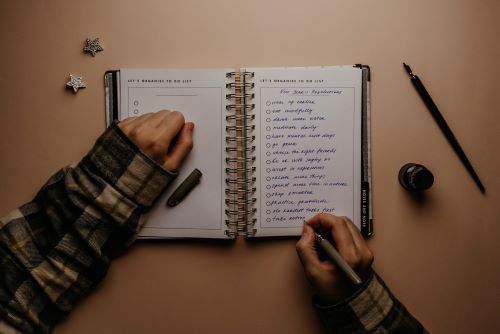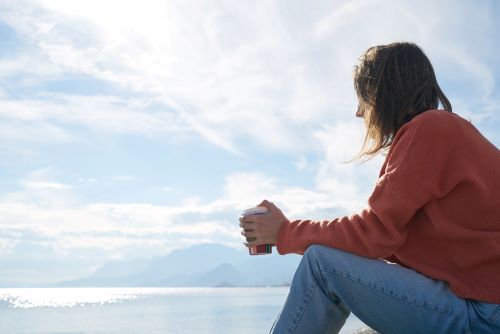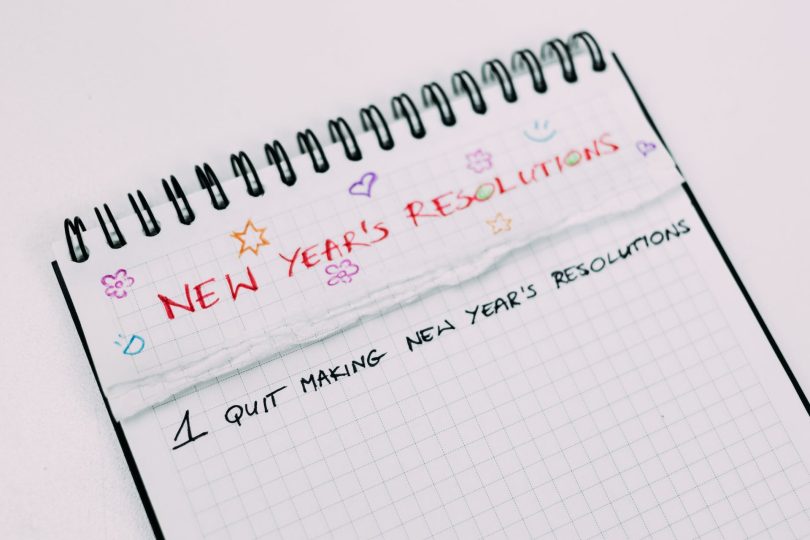Resolutions That Actually Stick & Make Us Feel Good
This New Year’s Eve, I had dinner with a group of friends, and at some point in the conversation the most common question for this time of year came up: Who’s got any New Year Resolutions? It was me who asked the question. Partially, because I am curious to know what plays in the lives of the people around me at the table, and partially to hear what kind of resolutions would come up. The first one was “Lose 10 kg”. This came as a shock to me, mostly because the person who said it, even from the most objective standpoint, needs to lose exactly 0 kilo, because they’re not even close to being overweight. But that’s not why I bring it up. Whether they are overweight (according to outdated standards) or not, why is this always on the list of resolutions?

Why Mindful Resolutions
Don’t get me wrong, I don’t have anything against setting goals around health or accomplishments for the new year, however… the question remains whether these goals:
- …are making us feel better about ourselves?
- …are sustainable for longer than 3 months (weeks?)? &
- …actually make us feel happier once we reach them?
Whether it is a weight goal, financial goal, or career goal, I think we should ask these 3 questions first. Most goals are based on the things that we believe we SHOULD do, rather than things that can actually make us feel better, happier, or more confident.
Looking at the statistics of New Year’s Resolutions, only about 8-10% of people achieve their goals.¹
I wonder, if the goals we set would work towards making us feel one of the 3 things (happier, better, more confident) would they be as hard to maintain?
If the change we made actually brought us joy and energy, would we stop?
Mindful Resolutions when Dealing with any Chronic Symptoms
How about, we start being more mindful about our resolutions and focus on how each of them make us feel in the process. And this does not only apply to people dealing with chronic symptoms, but to anyone just looking to feel better about themselves and in their skin. The idea is not always to do MORE, but rather think of where we can do less, put less pressure, simplify. Instead of the slogan “New Year, New You”, how about we make it “New Year, Be You”?
Below are 5 suggestions for more mindful new year resolutions that can help:
1. Replace Your Inner Critic with an Inner Coach
If you are dealing with any form of chronic pain or stress, the last thing you need is to add more to your plate, or beat yourself up for not doing X or Y. The inner critic has probably been around for a long time and develops in everyone around childhood determining our standards, yet that doesn’t mean they’re always helpful. ² One of the first resolutions I want to recommend is to fire your inner critic (we all have one and they can be loud and obnoxious) and hire an inner coach. Whenever the negative voice comes up, whether about yourself or even about others, remind them, they are no longer in service, and tune in to your coach or cheerleader instead. What would they say?
2. Stop Suppressing, Start Listening
Most of us have been taught to not fuss about negative feelings and ignore them until they go away. This may have served as a survival mechanism at some point in life, yet research has shown that this does not actually work, and anything we suppress will come up in one form or another. Whether it is in the form of an outburst, depression, or chronic symptoms, it will come out. Therefore, another thing I would encourage everyone to do this year, is to stop suppressing and start listening when such symptoms come up. This can feel hard in the beginning, but like any skill it is something we can train. This might not seem like a Feel Good resolution, however it will make us feel good over time. Listening to our body is probably one of the most important skills we can learn, to restore our Mindbody connection. ³ A simple practice is to sit by yourself, without distractions, and ask yourself “What do I feel?”, “Where do I feel it?”, and “What is my body trying to tell me?”.
3. Reintroduce 1 Thing That Brings You Joy
Most of us live our lives living up to other people’s expectations, whether we do it consciously or not. What I want to encourage though, is to reintroduce something this year that you do just for you. And not something that you SHOULD do, or for a specific outcome, it has to be something that you do because you enjoy the process of doing it, which brings a closed eyed smile on your face. The only rule I would add is that you do it AT LEAST MONTHLY. Schedule it as an important appointment, do the thing, and allow yourself to enjoy it (be it drawing, reading, hiking, sauna, gardening, climbing, …). If nothing comes to mind directly, ask yourself “What did I use to enjoy as a child?”, is there a version of that activity you could still do today? You can include friends or family in this activity, but it’s not a necessity. If you really can’t think of something, try something new this year.
4. Make Use of Nature’s Feel-Good Boosters
Nature is full of simple feel-good resources. For instance, every day’s first light can help us wake up in the morning and sets our circadian clock. By simply standing or walking outside at dusk for 5 minutes (even if it’s just with an open window, and even on a cloudy day), we naturally set our inner clocks, which not only boosts our mood, but also helps us sleep better at night. ⁴
Another one is grounding, a simple practice where you take off your shoes and you walk around barefoot outside in the grass, on the beach, or even just in your own home. This may sound very hippie-dippie, but there is now research backing up the beneficial effects such as reducing inflammation, reducing stress, and nervous system regulation. ⁵ ⁶ Just the mere act of being in nature has found to be beneficial. In Japan they have a practice called forest bathing, which is being in nature and being present to your surroundings. This can be done walking or sitting in a natural environment, like a forest or park, and just being. It has shown to counter issues such as: stress, anxiety, inflammatory problems, gastrointestinal issues, strokes and even cancer. ⁷

5. Simplify
Of all the things we do day-to-day, or on a weekly basis, most of them are just there by habit. Now it is time to have a conscious look at it and determine if these things are actually necessary. Be honest, are you just doing them because you believe they’re expected? I want to encourage you to make a list with 2 columns: in the first, write a list of things you: do not need/ not enjoy/ what would you not miss doing/ might be depleting you? In the next column write down: How can we simplify, delegate, or eliminate this? Try to simplify at least 3 things for this year.
I hope this helps. Even if you have already set resolutions, you can revise them whenever you see fit. If you read this article in the middle of May, this is just as good a time to start. Whichever resolutions you choose to set, just a kind reminder to ask yourself: Will doing this make me feel better? Is it sustainable for longer than 3 months? Will I be happy/ happier when I reach the desired outcome? And most importantly, Will I enjoy the process?
Happy new year/ month/ week/ Tuesday!
Sources
- https://blog.experiencepoint.com/2022-new-year-new-me-why-new-years-resolutions-fail
- https://www.psychologytoday.com/us/blog/anxiety-in-high-achievers/202101/how-contain-your-inner-critic
- The Mindbody Prescription: Healing the Body, Healing the Pain, John E. Sarno, 1998, Grand Central Publishing
- Blume C, Garbazza C, Spitschan M. Effects of light on human circadian rhythms, sleep and mood. Somnologie (Berl). 2019 Sep;23(3):147-156. doi: 10.1007/s11818-019-00215-x
- Chevalier G, Sinatra ST, Oschman JL, Sokal K, Sokal P. Earthing: health implications of reconnecting the human body to the Earth’s surface electrons. J Environ Public Health. 2012;2012:291541. doi: 10.1155/2012/291541. Epub 2012 Jan 12. PMID: 22291721; PMCID: PMC3265077.
- Oschman JL, Chevalier G, Brown R. The effects of grounding (earthing) on inflammation, the immune response, wound healing, and prevention and treatment of chronic inflammatory and autoimmune diseases. J Inflamm Res. 2015 Mar 24;8:83-96. doi: 10.2147/JIR.S69656. PMID: 25848315; PMCID: PMC4378297.
- https://www.theguardian.com/environment/2019/jun/08/forest-bathing-japanese-practice-in-west-wellbeing



